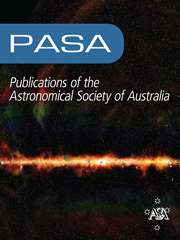Article contents
A Radio Polarimeter-Spectrometer
Published online by Cambridge University Press: 25 April 2016
Extract
The polarization characteristics of celestial radio signals are a major part of the observable nature of the radiation. Stokes polarimeters, instruments for measuring the complete polarization properties of radiation, are usually narrowband devices in order to minimise depolarization effects originating in the source or in the medium through which the radiation propagates. To measure the broadband polarization behaviour of a source, a Stokes polarimeter-spectrometer is required. Such an instrument allows the frequency dependence of each Stokes parameter to be deduced, making it possible to apply corrections to each parameter to account for known forms of polarization distortion (e.g. Faraday rotation). It is also possible to remove delay distortion from impulsive sources such as pulsars by processing the spectrometer data according to the usual de-dispersion algorithms. In some studies observation of distortion phenomena may be the major aim and a polarimeter spectrometer greatly facilitates measurements of these effects.
Information
- Type
- Contributions
- Information
- Copyright
- Copyright © Astronomical Society of Australia 1983
References
- 1
- Cited by

